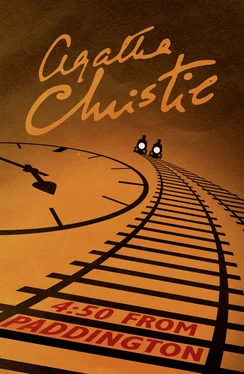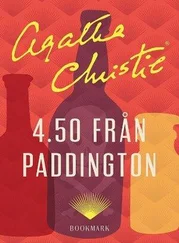Her success was immediate and assured. By now, after a lapse of some years, she was known all over the British Isles. It was quite customary for wives to say joyfully to husbands, ‘It will be all right. I can go with you to the States. I’ve got Lucy Eyelesbarrow! ’ The point of Lucy Eyelesbarrow was that once she came into a house, all worry, anxiety and hard work went out of it. Lucy Eyelesbarrow did everything, saw to everything, arranged everything. She was unbelievably competent in every conceivable sphere. She looked after elderly parents, accepted the care of young children, nursed the sickly, cooked divinely, got on well with any old crusted servants there might happen to be (there usually weren’t), was tactful with impossible people, soothed habitual drunkards, was wonderful with dogs. Best of all she never minded what she did. She scrubbed the kitchen floor, dug in the garden, cleaned up dog messes, and carried coals!
One of her rules was never to accept an engagement for any long length of time. A fortnight was her usual period—a month at most under exceptional circumstances. For that fortnight you had to pay the earth! But , during that fortnight, your life was heaven. You could relax completely, go abroad, stay at home, do as you pleased, secure that all was going well on the home front in Lucy Eyelesbarrow’s capable hands.
Naturally the demand for her services was enormous. She could have booked herself up if she chose for about three years ahead. She had been offered enormous sums to go as a permanency. But Lucy had no intention of being a permanency, nor would she book herself for more than six months ahead. And within that period, unknown to her clamouring clients, she always kept certain free periods which enabled her either to take a short luxurious holiday (since she spent nothing otherwise and was handsomely paid and kept) or to accept any position at short notice that happened to take her fancy, either by reason of its character, or because she ‘liked the people’. Since she was now at liberty to pick and choose amongst the vociferous claimants for her services, she went very largely by personal liking. Mere riches would not buy you the services of Lucy Eyelesbarrow. She could pick and choose and she did pick and choose. She enjoyed her life very much and found in it a continual source of entertainment.
Lucy Eyelesbarrow read and re-read the letter from Miss Marple. She had made Miss Marple’s acquaintance two years ago when her services had been retained by Raymond West, the novelist, to go and look after his old aunt who was recovering from pneumonia. Lucy had accepted the job and had gone down to St Mary Mead. She had liked Miss Marple very much. As for Miss Marple, once she had caught a glimpse out of her bedroom window of Lucy Eyelesbarrow really trenching for sweet peas in the proper way, she had leaned back on her pillows with a sigh of relief, eaten the tempting little meals that Lucy Eyelesbarrow brought to her, and listened, agreeably surprised, to the tales told by her elderly irascible maidservant of how ‘I taught that Miss Eyelesbarrow a crochet pattern what she’d never heard of! Proper grateful, she was.’ And had surprised her doctor by the rapidity of her convalescence.
Miss Marple wrote asking if Miss Eyelesbarrow could undertake a certain task for her—rather an unusual one. Perhaps Miss Eyelesbarrow could arrange a meeting at which they could discuss the matter.
Lucy Eyelesbarrow frowned for a moment or two as she considered. She was in reality fully booked up. But the word unusual , and her recollection of Miss Marple’s personality, carried the day and she rang up Miss Marple straight away explaining that she could not come down to St Mary Mead as she was at the moment working, but that she was free from 2 to 4 on the following afternoon and could meet Miss Marple anywhere in London. She suggested her own club, a rather nondescript establishment which had the advantage of having several small dark writing-rooms which were usually empty.
Miss Marple accepted the suggestion and on the following day the meeting took place.
Greetings were exchanged; Lucy Eyelesbarrow led her guest to the gloomiest of the writing-rooms, and said: ‘I’m afraid I’m rather booked up just at present, but perhaps you’ll tell me what it is you want me to undertake?’
‘It’s very simple, really,’ said Miss Marple. ‘Unusual, but simple. I want you to find a body.’
For a moment the suspicion crossed Lucy’s mind that Miss Marple was mentally unhinged, but she rejected the idea. Miss Marple was eminently sane. She meant exactly what she had said.
‘What kind of a body?’ asked Lucy Eyelesbarrow with admirable composure.
‘A woman’s body,’ said Miss Marple. ‘The body of a woman who was murdered—strangled actually—in a train.’
Lucy’s eyebrows rose slightly.
‘Well, that’s certainly unusual. Tell me about it.’
Miss Marple told her. Lucy Eyelesbarrow listened attentively, without interrupting. At the end she said:
‘It all depends on what your friend saw—or thought she saw –?’
She left the sentence unfinished with a question in it.
‘Elspeth McGillicuddy doesn’t imagine things,’ said Miss Marple. ‘That’s why I’m relying on what she said. If it had been Dorothy Cartwright, now—it would have been quite a different matter. Dorothy always has a good story, and quite often believes it herself, and there is usually a kind of basis of truth but certainly no more. But Elspeth is the kind of woman who finds it very hard to make herself believe that anything at all extraordinary or out of the way could happen. She’s almost unsuggestible, rather like granite.’
‘I see,’ said Lucy thoughtfully. ‘Well, let’s accept it all. Where do I come in?’
‘I was very much impressed by you,’ said Miss Marple, ‘and you see, I haven’t got the physical strength nowadays to get about and do things.’
‘You want me to make inquiries? That sort of thing? But won’t the police have done all that? Or do you think they have been just slack?’
‘Oh, no,’ said Miss Marple. ‘They haven’t been slack. It’s just that I’ve got a theory about the woman’s body. It’s got to be somewhere . If it wasn’t found in the train, then it must have been pushed or thrown out of the train—but it hasn’t been discovered anywhere on the line. So I travelled down the same way to see if there was anywhere where the body could have been thrown off the train and yet wouldn’t have been found on the line—and there was. The railway line makes a big curve before getting into Brackhampton, on the edge of a high embankment. If a body were thrown out there, when the train was leaning at an angle, I think it would pitch right down the embankment.’
‘But surely it would still be found—even there?’
‘Oh, yes. It would have to be taken away … But we’ll come to that presently. Here’s the place—on this map.’
Lucy bent to study where Miss Marple’s finger pointed.
‘It is right in the outskirts of Brackhampton now,’ said Miss Marple, ‘but originally it was a country house with extensive park and grounds and it’s still there, untouched—ringed round with building estates and small suburban houses. It’s called Rutherford Hall. It was built by a man called Crackenthorpe, a very rich manufacturer, in 1884. The original Crackenthorpe’s son, an elderly man, is living there still with, I understand, a daughter. The railway encircles quite half of the property.’
‘And you want me to do—what?’
Miss Marple replied promptly.
‘I want you to get a post there. Everyone is crying out for efficient domestic help—I should not imagine it would be difficult.’
Читать дальше












